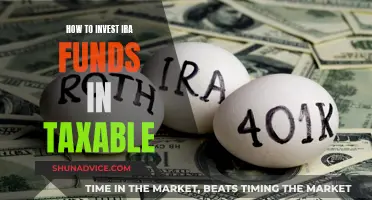
Money market funds are a type of mutual fund that invests in low-risk, short-term debt securities. They are designed to offer a safe, stable investment option for money that may be needed in the short term. Prime money market funds invest in high-quality, short-term money market securities issued by U.S. and foreign entities, including corporations, financial institutions, and the U.S. government. These funds can provide investors with a diversified, professionally managed portfolio and high daily liquidity.
| Characteristics | Values |
|---|---|
| Definition | A type of mutual fund that invests in short-term debt securities |
| Investments | Floating-rate debt, commercial paper, corporate notes, and other private instruments from domestic and foreign issuers |
| Issuers | Corporations, U.S. government agencies, and government-sponsored enterprises (GSEs) |
| Regulation | Rule 2a-7 of the Investment Company Act of 1940 |
| Net Asset Value (NAV) | $1 per share |
| Risk | Low-risk, low-return |
| Liquidity | High liquidity |
| Taxation | Taxable or tax-exempt, depending on the fund's portfolio |
What You'll Learn

Prime money market funds invest in floating-rate debt
Prime money market funds are a type of mutual fund that invests in floating-rate debt and commercial paper of non-Treasury assets. These funds are also known as general-purpose funds and are considered retail money funds. They are only available to natural persons.
Prime money market funds invest in high-quality, short-term money market securities issued by U.S. and foreign entities, including corporations, financial institutions, and the U.S. government. The funds are designed to provide high liquidity with lower risk, stability of capital, and typically higher yields than some other cash products.
Prime money market funds are considered to be one of the lowest-volatility types of investments. They are required by regulations to invest in short-term, high-credit-quality debt securities. The funds' assets are invested in any eligible U.S. dollar-denominated money market instruments, as defined by the U.S. Securities and Exchange Commission (SEC) regulations.
In addition to floating-rate debt and commercial paper, prime money market funds may also invest in other types of debt securities, such as:
- Certificates of deposit
- Corporate notes
- Repurchase agreements
- Reverse repurchase agreements
- Asset-backed commercial paper
Prime money market funds offer a convenient way to access potentially higher yields on cash with no transaction fees to buy or sell and a minimum investment as low as $0.
Strategies for Investing in PE Funds: A Comprehensive Guide
You may want to see also

They invest in commercial paper of non-Treasury assets
Prime money market funds invest in floating-rate debt and commercial paper of non-Treasury assets. These funds are also known as general-purpose funds or taxable funds. They invest in high-quality, short-term money market securities issued by U.S. and foreign entities, including corporations, financial institutions, and the U.S. government. Prime money market funds are considered retail money funds and are only available to natural persons.
Prime money market funds primarily invest in taxable short-term obligations issued by corporations and banks, as well as repurchase agreements and asset-backed commercial paper. The commercial paper they invest in is typically unsecured short-term corporate debt. Prime money market funds are considered to be one of the least volatile types of mutual fund investments. They are also highly liquid, allowing investors to access their funds daily without penalties.
Prime money market funds are subject to certain regulations. For example, they are required to invest in short-term, high-credit-quality money market instruments as defined by the U.S. Securities and Exchange Commission (SEC). They are also subject to liquidity fees and redemption gates during times of extreme market stress. These fees and gates are designed to help maintain the stability of the fund.
Prime money market funds offer higher yields than tax-exempt funds, but any income is subject to taxes. They are suitable for investors seeking a safe, stable investment option for money they may need to access in the short term.
SpaceX Investors: Fidelity Funds and Their Interests Explored
You may want to see also

They invest in corporate and bank debt
Prime money market funds invest in corporate and bank debt, including commercial paper, certificates of deposit, corporate notes, and other private instruments from domestic and foreign issuers. These funds provide investors with access to higher yields on cash and are considered retail money funds, only available to natural persons.
Prime money market funds are a type of mutual fund that invests in high-quality, short-term money market securities. They are designed to offer high liquidity with lower risk and stability of capital. These funds are an attractive option for investors as they provide diversification and the potential for enhanced yield through active management.
The securities held by prime money market funds have very short maturities and high credit quality. The funds comply with regulatory requirements regarding the quality, maturity, liquidity, and diversification of their investments. Prime funds can invest in a range of instruments, including:
- Commercial paper
- Certificates of deposit
- Corporate notes
- Repurchase agreements
- Asset-backed commercial paper
Prime money market funds are subject to regulatory rules that can affect the yield generated by the portfolio. These funds are considered retail money funds and are only available to natural persons. Institutional investors can invest in variable share price prime money market funds, which have a floating net asset value.
Prime money market funds are an important component of the financial market, offering investors a safe and liquid investment option. They are well-suited for investors with a low tolerance for volatility and those seeking to diversify their portfolio with conservative investments.
Mutual Funds: Investing in High Markets
You may want to see also

They invest in repurchase agreements
Prime money market funds invest in repurchase agreements, also known as "repos". A repurchase agreement is an agreement to buy a security at one price and simultaneously sell it back at an agreed-upon price. These repos are overnight loans to the Federal Reserve, backed by US Treasuries. The Federal Reserve buys them back the next day at a slightly higher price, and this price premium is the implicit interest rate.
Prime money market funds also invest in commercial debt, certificates of deposit, corporate commercial paper, and other bank debt securities. They are considered retail money funds and are only available to natural persons.
A Smart Guide to Investing in Dow Jones Index Funds
You may want to see also

They invest in asset-backed commercial paper
Prime money market funds invest in floating-rate debt and commercial paper of non-Treasury assets. These include asset-backed commercial paper (ABCP), which is a short-term investment vehicle with a maturity date of no more than 270 days. ABCP is a type of commercial paper that is collateralized by financial assets, which can include a mix of asset-backed securities (ABS), residential mortgages (RMBS), commercial loans, and collateralized debt obligations (CDOs).
ABCP is typically issued by a non-bank financial institution, such as a conduit or special purpose vehicle (SPV). A conduit is a vehicle set up by a sponsoring financial institution for the sole purpose of purchasing and holding financial assets from a variety of asset sellers. The SPV or conduit holds the collateral assets, protecting them in the case of the bankruptcy of the financial institution. The assets are then used to back the notes issued by the financial institution.
The collateral for ABCP often consists of the corporation's expected future payments or receivables, such as payments expected to be collected from auto loans, credit card debt, student loans, or residential mortgages. These expected payments are known as accounts receivables. The proceeds of an ABCP issue are primarily used to obtain interests in various types of assets, either through asset purchase or secured lending transactions.
ABCP offers several advantages over typical commercial paper, including providing more liquidity to the market and being safer due to the collateral backing. However, there are also disadvantages and concerns related to ABCP, including liquidity risk and the possibility of a false sense of security leading to lax lending standards.
Alternative Investment Funds: Diversifying Your Portfolio
You may want to see also
Frequently asked questions
Prime money market funds are a type of mutual fund that invests in high-quality, short-term money market securities issued by U.S. and foreign entities, including corporations, financial institutions, and the U.S. government.
Prime money market funds invest in corporate commercial paper, repurchase agreements, certificates of deposit, and other bank debt securities.
Prime money market funds offer investors high liquidity, capital preservation, diversification, and the potential for enhanced yield.
Prime money market funds are not insured by the FDIC, so there is a risk of losing money. They are also subject to liquidity risk, price risk, and credit risk.







